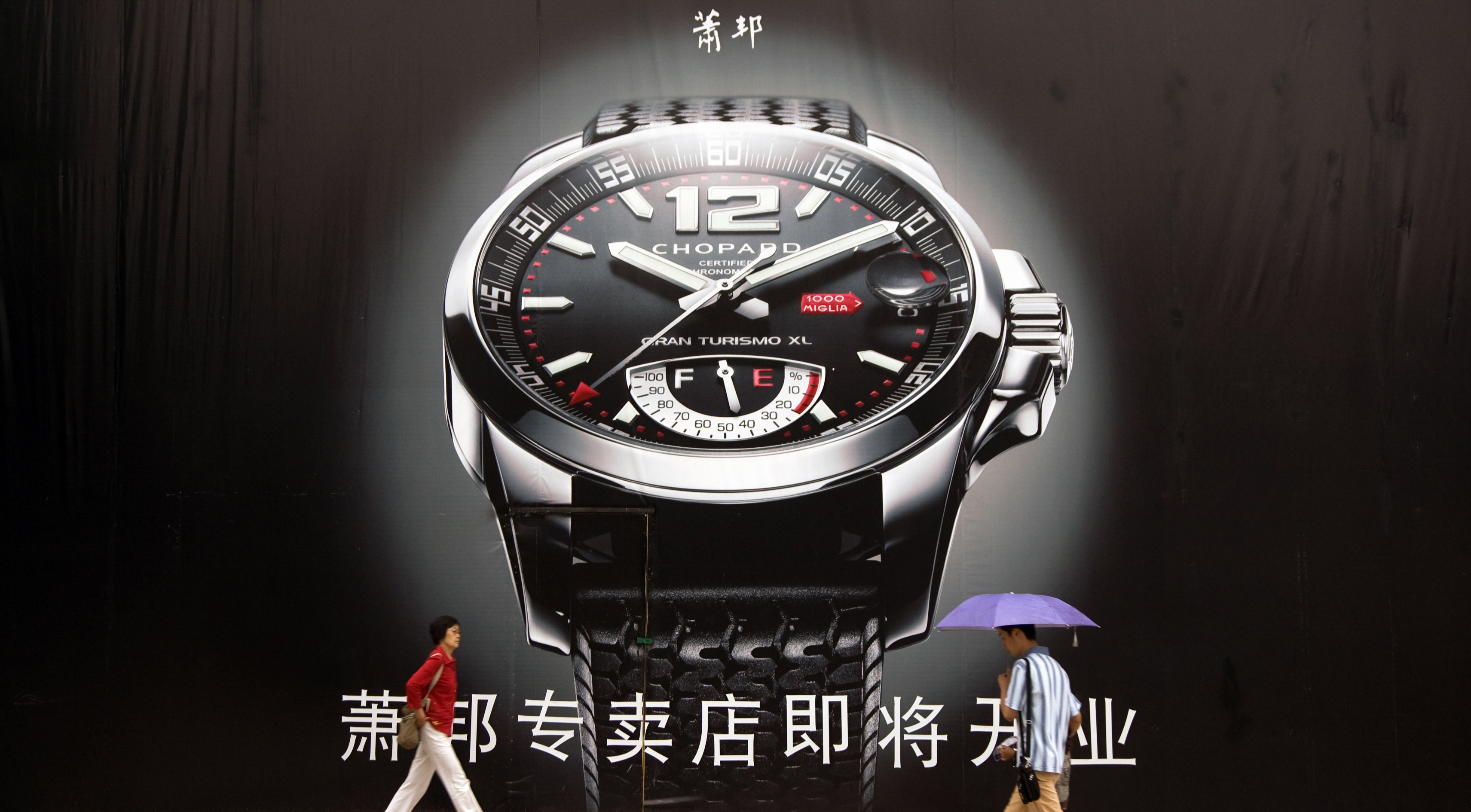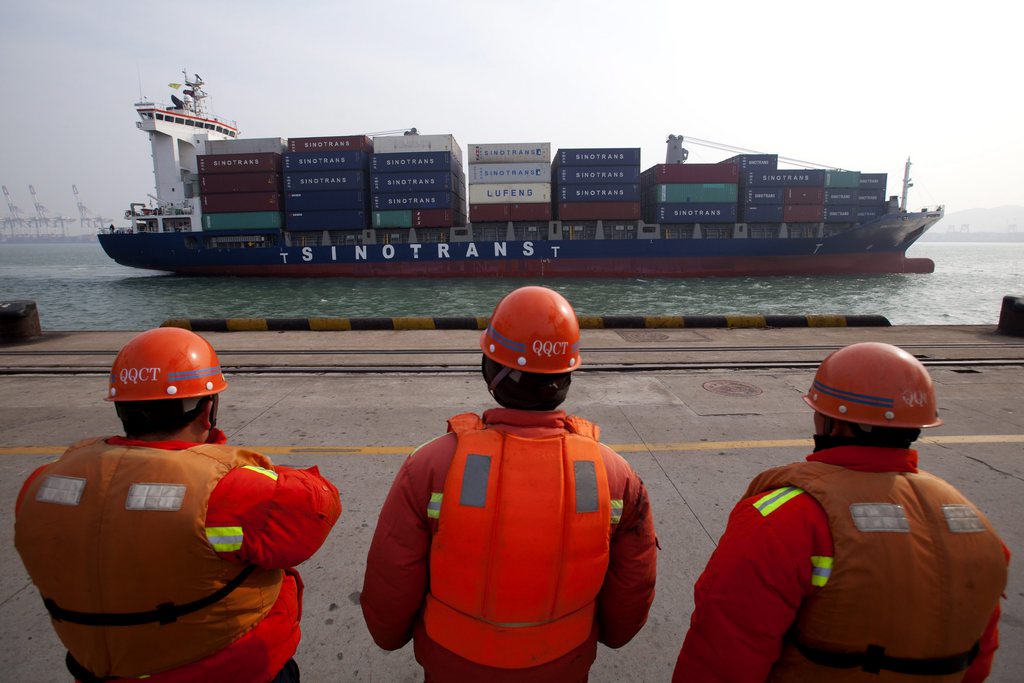
Is Swiss watchmaking’s China boom over?

Slower economic growth and a Chinese government anti-corruption campaign have cast a shadow over Swiss watch exports to China in 2013. But as the industry gears up for Baselworld, the world’s biggest watch trade fair, experts remain optimistic about the situation.
In 2000, Swiss exports of watches to China amounted to just CHF16.8 million ($19 million). By 2012, the value of these exports had multiplied by 100 to reach CHF1.6 billion.
Overall, Asian countries accounted for almost 70% of the Swiss watch industry’s growth during this boom period, according to Credit Suisse in its 2013 report on the Swiss watch industry.
Hong Kong and China are now placed first and fourth on the list of top Swiss watch importing countries and it is estimated that almost one in two watches worldwide are sold to a Chinese customer.
But cracks started to appear at the end of 2012 and in 2013 Swiss watch exports to China fell by 12.5%, to CHF1.44 billion.
Jean-Daniel Pasche, the president of the Federation of the Swiss Watch Industry, puts the situation down to the problems in the Chinese economy. “We have gone from a growth rate of around 12% in the mid-2000s, to 7.5% in 2013. Although it’s still an impressive figure, this drop has had an effect on consumption in China,” he says.
In December 2012, one month after his nomination to the head of the Chinese Communist Party, secretary general Xi Jinping launched a huge anti-corruption campaign, which is still ongoing.
It was designed to restore credibility to the ruling powers after the extravagant lifestyles of some members of the party had shocked the nation. Xi said that he would be targeting the “tigers” – the powerful – as well as the “flies”, the rank and file managers.
Within the space of a year, 20,000 officials had been penalised for infringing the new regulations. Officials are now keeping a lower profile and are not flashing around fancy watches in public, as did the head of the work safety bureau of the province of Shaanxi, convicted in autumn 2013 to 14 years’ imprisonment for accepting bribes. Nicknamed “watch brother” by Chinese web users, he had been photographed wearing no less than 11 different luxury watches.
It has now become a minefield for officials to accept gifts, a common custom. A watch is less obvious than a luxury car, because it can be stowed away in a draw for better days. But accepting it means you could be reported to the authorities or be at the mercy of blackmailers.
Corruption
The Chinese government’s crackdown on corruption (see infobox) is another reason. Often given to Communist Party officials as gifts in exchange for favours, watches have become one of the most potent symbols of corruption in China in recent years.
“This anti-corruption campaign is having an effect on watch exports. But it is hard to assess its true impact,” says Pasche.
It’s not the first time that Beijing has clamped down on dubious practices within its administration. But this time the new president Xi Jinping is taking it very seriously as he sees endemic corruption as a real threat to the party itself, explains Delphine Centlivres, head of the Swiss section of the non-governmental organisation Transparency International.
“The transition towards the market economy has led to a marked increase in the level of corruption in China in recent years, especially as the state keeps a stake in privatised companies,” she adds. “Some top officials have a lot of decision power and they are the target of this campaign.”
Centlivres said that such widespread corruption could lead to the severing of ties between the population and the Party. “The level of indignation is high and the government wants to avoid a revolt by the people, a new Tiananmen, at all costs.”
Prestigious brands
Every week officials are convicted and the penalties are severe. Pictures on the television or circulated on the internet sometimes show these people wearing luxury Swiss watches. Timepieces a little down the scale have been less tarnished by association.
“Among watches, high end brands were more affected than affordable brands. Longines, Rado, Tissot continued to grow,” explains Andrea Gerst, co-manager of JB Luxury Brands Fund, Swiss & Global Asset Management, an investment fund which focuses on luxury brands.
The Chinese authorities have also placed restrictions on advertising for luxury products in certain cities as well. This has been reflected in the Swiss watch export statistics: last year Switzerland exported a record number of watches to China, but the average value of each unit fell by almost CHF100.
Pasche plays down the exports drop, which “came after more than ten years of crazy growth”. Credit Suisse also points out in its report that there is no cause for alarm.
“Given the rapid pace at which the Chinese market has developed in preceding years, the decline in Swiss watch exports should be seen as a normalization rather than a slump,” said the bank in its report.
“On account of further improvements in people’s living standards and the dismantling of trade barriers [under the free trade agreement], China is likely to continue growing as an export destination.”

More
China opens up to Swiss exporters
Free trade
The free trade agreement signed in July 2013 between Switzerland and China – and ratified by parliament earlier this month – should allow the reduction of tariffs on Swiss watch imports by 60% over ten years.
Many Chinese prefer in fact to buy their timepieces in Hong Kong, Europe or in the United States for price reasons.
The Chinese appetite for luxury products remains strong, especially when they travel abroad, noted Gerst.
“The Chinese have replaced the Americans as the biggest tourism nation in the world, based on expenditure. The long-term growth story for the luxury sector continues; this year the industry is expected to grow 7%-9%,” she says.
But one question remains: is it not a problem that Swiss watches have become the object most associated with corruption in China?
“No, not at all,” insists Pasche. “Swiss watches continue to have an excellent reputation among the Chinese, we are not feeling any loss of interest on their part.”
But it is an issue for Swiss watchmakers who are active on the Chinese market. Quite a few, including the Swatch Group, the largest watchmaker worldwide, refused requests by swissinfo.ch for an interview.
(Translated from French by Isobel Leybold-Johnson)

In compliance with the JTI standards
More: SWI swissinfo.ch certified by the Journalism Trust Initiative


























You can find an overview of ongoing debates with our journalists here . Please join us!
If you want to start a conversation about a topic raised in this article or want to report factual errors, email us at english@swissinfo.ch.